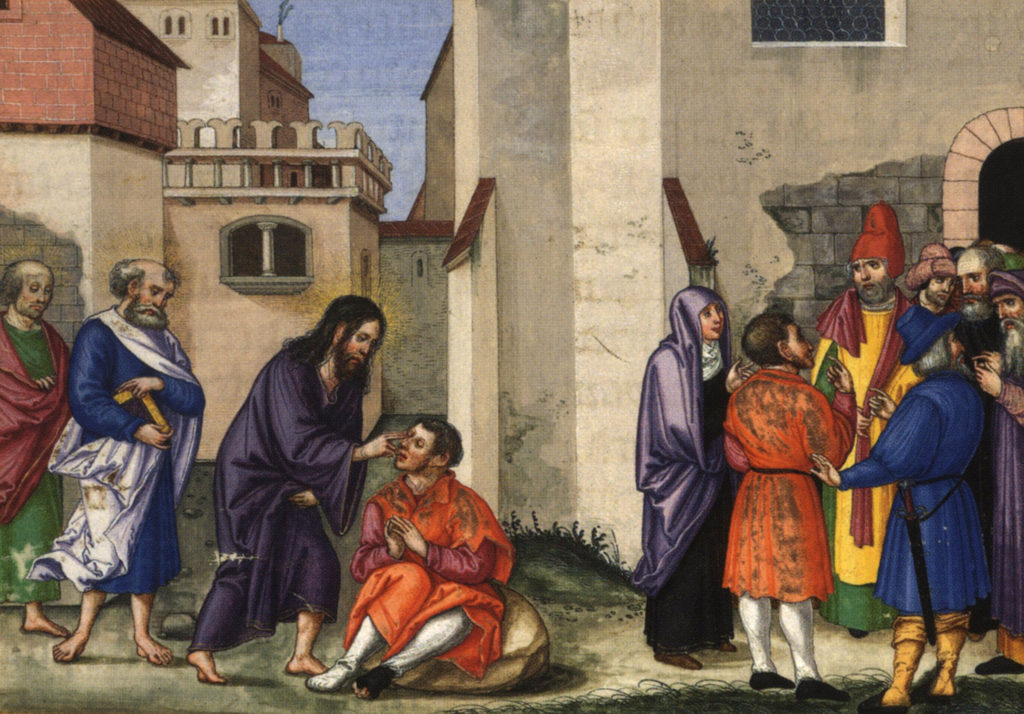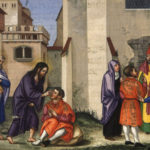Where God Is
Contributed By: Rev. Helen Harper
(Download Reflection)
Rev. Harper is the Priest at St. Peter’s Episcopal Church in Niagara Falls. Today’s reflection is her excellent homily from March 26, 2020.
When Jesus and his disciples saw a man blind from his birth the disciples asked him this question: “Rabbi, who sinned, this man or his parents, that he was born blind?”
John 9:1-5
As he went along, he saw a man
blind from birth. His disciples asked him, “Rabbi, who sinned, this man or his
parents, that he was born blind?”
“Neither this man nor his parents sinned,” said Jesus, “but this happened so
that the works of God might be displayed in him. As long as it is day, we must
do the works of him who sent me. Night is coming, when no one can work. While I
am in the world, I am the light of the world.”
As humans we always want an explanation in the face of tragedy, pain and suffering – especially tragedy, pain, and suffering that apparently make no sense that we can neither understand nor justify. We know that much of our pain—and the pain in the world—is hard for us to understand. It’s like the fate of the man born blind; it just happens. So, we all ask our own versions of “Who sinned, this man or his parents?” We ask why there is so much pain; why people, especially good people, get sick or get hurt when it isn’t their fault. We might want to extend this question to our current situation with the outbreak of the deadly virus we are experiencing.
We usually ask why so many die so young. We wonder why families so often do not work out the way they should work out, the way everybody wants them to work out. We wonder about earthquakes and tsunamis. We wonder about numerous other tragedies.
The disciples wanted to understand this tragedy—and with it, other tragedies. They wanted to know if the man had become blind because of his own carelessness, or if someone else had blinded him on purpose, then it would still be a tragedy, but it would make more sense; it would be easier to deal with. But that’s not what happened. So, the disciples ask.
One of the traditional answer in Jesus’ tradition had been that tragedies such as this one are a case where the sins of the parents on the children. Both Numbers (14:18)
“…the place to find God is in the middle of a mess, in the very worst parts of it. There is where God is working to bring forth something new…”
and Deuteronomy (5:9) specifically saw this: “The parents have eaten sour grapes, and the children’s teeth are set on edge.” What this means is that the parents sinned and the children suffered. And while this is not particularly reassuring, it does at least offer an explanation, and shows that God is part of everything, and part of a world that suffers. But there are problems with this answer. It just doesn’t feel right, and many of the great thinkers in Israel’s tradition like Jeremiah (31:29 and Ezekiel (18:2) flatly and very specifically denied this quotation. They insisted that God did not skip generations, and said God treated people as individuals, not as heirs of someone else’s sin.
But some other thinkers came up with an interesting alternative. They said a child could sin while it was still in the womb, and being born blind would be punishment for that sin. So when the disciples asked Jesus their question, they were asking Jesus to choose from two standards.
Jesus rejects the explanation that bad things happen because the victims are bad, or because the devil makes them happen, or because people don’t have enough faith, or because they don’t pray correctly. Neither Jesus nor the Christian faith gives us answers to the problem in the way we want answers. Instead we’re left with the fact that we live in a world that really isn’t fair, a world that is marked by ambiguity and inconsistency, a world that is dangerous.
Jesus says two more things on this topic. The first occurs when Jesus says the man was born blind so that the works of God can be made manifest through him. And this is the place to look for God both in the current tragedy we are experiencing and all other tragedies. God will not be found giving people cancer, birth defects, earthquakes, strokes, car wreaks and blindness. Instead, the place to find God is in the middle of a mess, in the very worst parts of it. There is where God is working to bring forth something new—not something that fixes the mess, but something that redeems and transforms it.
The God who is found in the middle of tragedies is the God who is active there. It is the God who has wounds on his hands and feet and side. It’s the God who knows us, the God who cares about us, the God who remembers what suffering is like. It is the God who shares our suffering and pain. This is the God who takes ALL our tragedies into himself, into the vastness of his compassion and into his infinite love.
Rev. Hellen Harper


